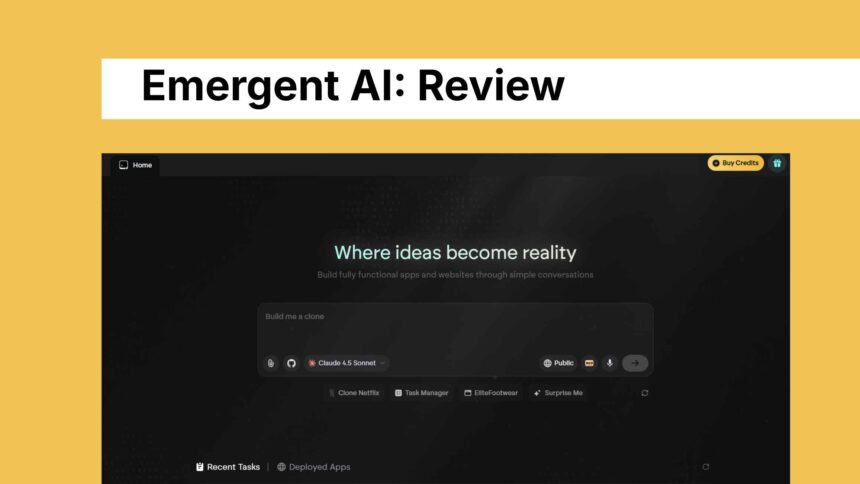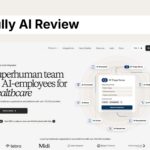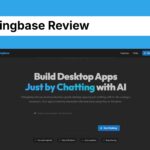Emergent is an AI-powered platform that allows users to create full-stack web applications by describing their ideas in simple English.
You don’t need to write code line-by-line, you can communicate with an AI agent who plans and codes, runs tests, and then deploys your program on its own.
It’s made for freelancers, founders and developers who wish to cut down on time by producing applications that are production-ready.
What is Emergent AI?
Emergent AI describes itself as an “AI developer” that converts human thoughts into fully-functional applications.
After you have described your application The platform’s AI system will create the frontend, design backend, as well as the deployment process in just a few minutes.
It eliminates the old codes that block users and lets non-technical users easily launch apps.
The idea behind the platform is based on the notion that of “vibe coding,” which involves creating digital goods by using natural language.
From authentication and database configuration through hosting Emergent simplifies the majority of tedious tasks. Users are able to alter, expand, or export their project based on their specific requirements.
Features of Emergent AI
A single of the more remarkable aspects of Emergent AI is the speed at which it can go from conception to implementation.
The platform makes use of AI agents, which communicate between themselves and users to provide more information about the project and structure the app and then implement the app.
The system supports the creation of a front-end automatically, back-end development that includes authentication, and real-time deployment of managed infrastructure.
It is possible to connect databases, create user accounts and connect payment platforms without having to write one word of code.
The built-in hosting feature also permits users to set up an individual domain, or export their code if they want self-hosting.
The workflow of Emergent is conversational. Start by typing your idea, then the AI is constantly refining the idea until it’s finished.
Every choice, including the framework, stack or design — is discussed in a collaborative manner and makes it feel like working with the real developers.
Pricing and Credit System
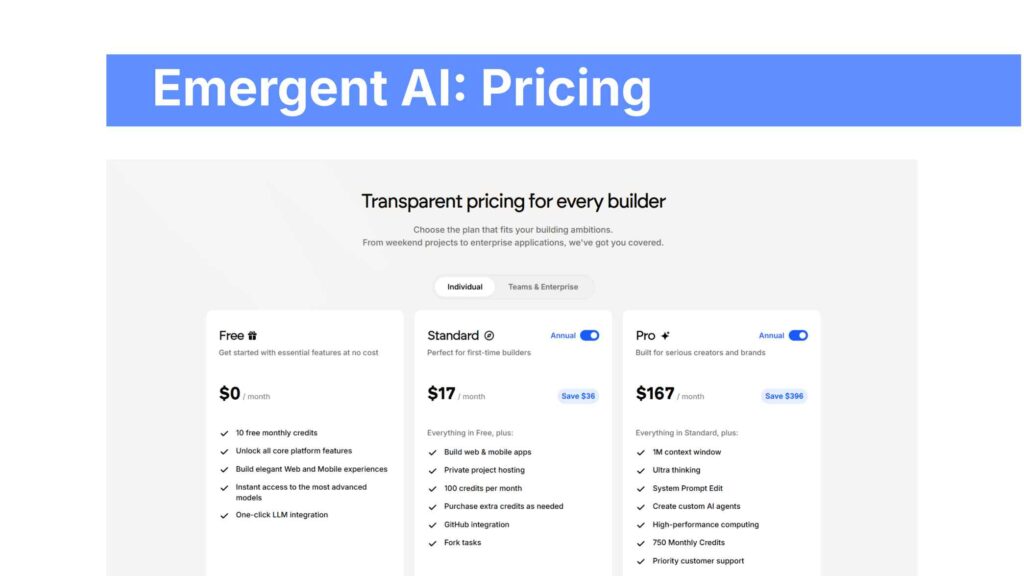
Emergent AI employs a credit-based system instead of a fixed subscription. Users are given a small amount of credits with their free account, and are able to use for basic tests or small-scale builds.
To build more applications or develop production versions, more credits are needed.
There are paid plans with larger credit bundles. These credits are used each when you request the AI to build the app, test it, or deploy an application.
Once it is installed, the application consumes a certain amount of credits each month to stay active and on the system.
Prices can differ however, it typically starts at around $10 per month dependent on the amount of usage and amount of applications that are deployed.
This pricing model is suitable for people who only have to develop a couple of projects on occasion. However, for those who are heavy users or organizations that have several builds, the price can increase rapidly.
Pros and Cons of Emergent AI
Emerging AI has a number of strengths which make it stand out from the expanding AI app builders market. The primary benefit is speed.
What could take a programmer many weeks to develop can now be developed in less than an hour. The interface is easy to use and the AI’s communications style is natural and human.
Another advantage is the flexibility. It is possible to export the code and alter it later, or even scale your application without locking it to the platform forever.
Automatic deployment also can cut down time by managing hosting and updates in the background.
But, there are certain disadvantages to be aware of. Because Emergent utilizes AI to write code, the quality of the code can be different based on the level of complexity of your application.
There is a chance that you’ll require a review or adjustment of the output that you generate to make sure it conforms to your business needs.
The credit-based pricing model could also be expensive in the event that you regularly create or implement new apps. In addition, although it’s an effective tool for MVPs and prototypes but reliability for enterprise still requires enhancement.
How It Compares to Traditional Development
As compared to traditional coding Emergent AI significantly reduces the amount of time needed to create and launch a new app.
A skilled programmer could require weeks to develop the same functions that Emergent can create in a matter of minutes. This makes it ideal for freelancers or startups who have to present demos of their work quickly.
But, fully manual programming still gives you greater control, optimization and flexibility. Developers who require advanced features or designs that are extremely specific might find Emergent’s output to be too general.
In those instances the platform is best used as an rapid prototyping tool, instead of a full replacement for teams of developers.
Best Alternatives to Emergent AI
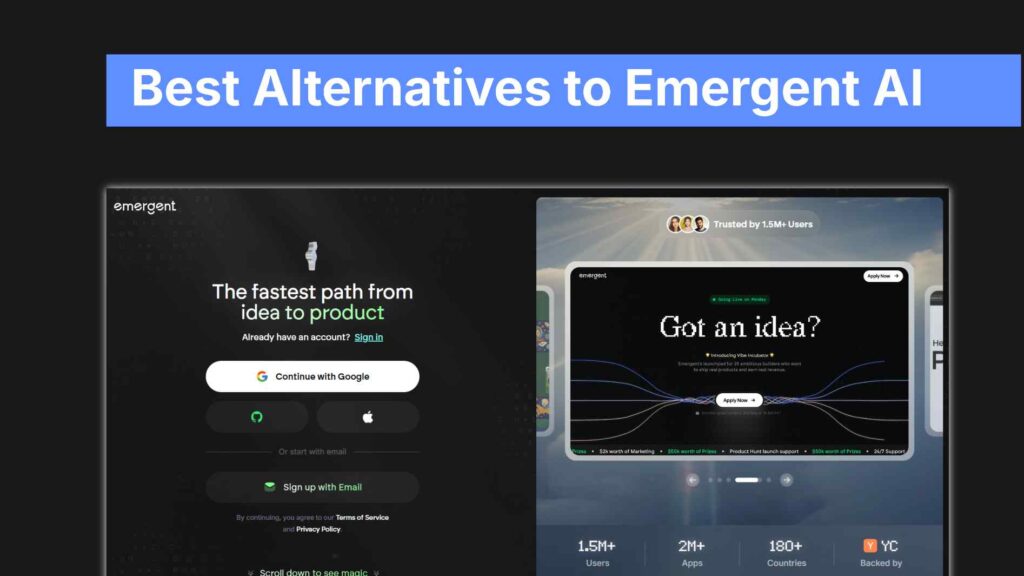
Google AI Studio and Firebase Studio
Google AI Studio, especially its Build Mode is designed to help users create and launch Gemini-powered apps.
When it is paired when paired with Firebase Studio, it becomes an all-in-one solution for creating hosting, managing and hosting complete stack AI applications on the cloud.
Together, they provide developers an easy connectivity to Google’s entire ecosystem and offer the latest AI capabilities as well as a reliable infrastructure.
This combo is an excellent alternative to Emergent AI because it is able to support the similar “idea to app” concept and also offers the benefits of Google’s integrations and tools.
It’s designed for those who require a deep connection to Google services and would prefer to use Gemini models to build high-quality production.
Lovable and Rocket new
Loveable as well as Rocket.new are AI app builders created to transform plain text concepts into fully-functional prototypes. They automatically create the user interface as well as backend logic and manage deployment in a matter of steps.
The platforms are similar to Emergent’s with an end-to -end experience in which you specify the features you require and the system creates it.
They are great for people or founders at the beginning of their career searching for an AI-driven application builder with similar capabilities as Emergent AI but with another company.
GitHub Copilot and Cursor
GitHub Copilot and Cursor focus on assisting developers in writing quicker by offering intelligent AI assistance.
Instead of building complete apps by themselves, these tools assist developers through their code environment, recommending precise lines, or even complete block of code.
They can be a good alternative for those who want to remain in control of their own code, but need AI assistance to improve their workflow.
They both integrate with well-known IDEs such as Visual Studio Code and JetBrains They are perfect for developers with experience who appreciate the precision and effectiveness of their everyday programming.
Replicate with AI Agents
Replit is an online platform that blends collaboration, coding, and deployment all in one location.
With the introduction to AI agents Replit is now able to provide intelligent recommendations, code generation and real-time features for managing projects all within a web browser.
It is competing with Emergent AI by providing developers with an entire environment in which to develop tests, launch, and test apps without the need to switch between tools.
Replit is a great choice for those who love working with their hands but want the benefit of AI-powered support to speed the development process and deploy.
Bubble, Glide, and Adalo
Bubble, Glide, and Adalo are among the best popular no-code platforms that allow the creation of mobile and web-based applications with basic visual builders.
The tools enable users to create plans, integrate databases or manage workflows with out writing one piece of code.
These apps vary from Emergent AI in the fact that they use drag-and-drop instead of conversational AI.
However, their experience in reliability, reliability, and solid customer support makes them ideal options for founders who are not technical and small companies that wish to create functional, production-ready applications in a short time.
Each tool is part of the mission of Emergent: to make application creation easier and faster.
But, Emergent AI’s agent-based approach is more akin to a conversation and gives users an enhanced sense of building using AI.
Conclusion
Emergent AI is an amazing invention that shows just the extent to which AI has advanced in the field of software development.
It allows anyone, ranging from individuals who are founders on their own, to small companies to build full-blown applications without having to hire large teams or manually writing code.
The workflow is intuitive and the speed of turnaround is quick and the result is often sufficient to be used in MVPs and internal applications.
Although it’s a great tool for testing ideas and creating small-scale apps, Emergent AI still has limitations in regards to complicated business analysis and enterprise level performance.
The credit system could be costly for builders who are frequent.
In the end, Emergent AI is best suited for designers who wish to go from concept to prototype in a short time. It’s a forward-thinking, intelligent tool that combines AI development efficiency with creativity.
As it develops and mature, it will soon be one of the best solutions for AI-driven software development.


